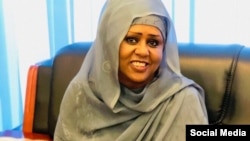Somalia's top leaders, all men, have struggled for years to tame the Horn of Africa nation's insecurity and corruption. Lawmaker Fawzia Yusuf Haji Adam says it's time for a woman's touch and on Tuesday announced her candidacy for president. But getting enough support from Somalia's lawmakers, the vast majority of them men, will be a challenge.
Fawzia says she will bring a new lease on life to the country, if elected, by prioritizing security, economic empowerment and education. Her male counterparts, she says, have failed to do so.
"We have been waiting for men for so long to sort out the problems of Somalia but till today we see there are no solutions so I have decided to stand for president and I have no doubt I will do a much better job than men," Fawzia said. "Islam does not stop women from going to politics or becoming head of state or in higher positions. If you go to Bangladesh, for the last 50 years almost there are women leaders replacing each other and it is the most conservative country in the Muslim world. The most populous country is Indonesia, there was a lady who was in charge, in Pakistan, we have so many other Muslim women [in charge] including Tanzania and Singapore,” she added.
Somalia’s indirect elections, scheduled for October, will see members of parliament selected by clan delegates. Members of parliament then decide who will be the next president.
Some citizens, like Abdirahman Omar in Mogadishu, believe that if given the opportunity, Fawzia, a former deputy prime minister and foreign minister, can bring change.
He says I am happy to welcome a female to run for the office of the president in Somalia. He says Mrs. Fawzia was tested and has knowledge and vision for leadership. "Likewise, women have been entrusted with various positions and if females are elected as president they will lead to positive change," he added.
Somalia is a Muslim nation with conservative traditions that make a majority of its citizens reject female leadership.
Omar Hussein is among those who thinks along traditional lines. He says he does not back the idea of a female to contest for a leadership position in Somalia. Somali culture as well as Islamic traditions bar women from holding such high positions with immense responsibilities, he added.
Analyst Anwar Abdifatah, a lecturer at Somalia’s National University, says it is not impossible for Fawzia to win the presidential election in parliament, but she will have to overcome longstanding traditions.
“It is democratic maturity to see women vying for the head of state in Somalia, considering the support of the expected 30% of women parliamentarians and few men who support a new leadership. However, despite her ambitions, Mrs. Fawzia will face a stiff challenge from strong Islamic and deep-rooted Somali culture that regards men as the only custodians of leadership,” Abdifatah said.
Somalia’s presidential and parliamentary elections were delayed last year following disagreements among political leaders about the process. Lawmakers briefly extended the term of President Mohamed Abdullahi Farmajo, only to withdraw the extension in the face of international and Somali opposition.
Somalia's Only Female Presidential Candidate Says Time for Women to Lead




